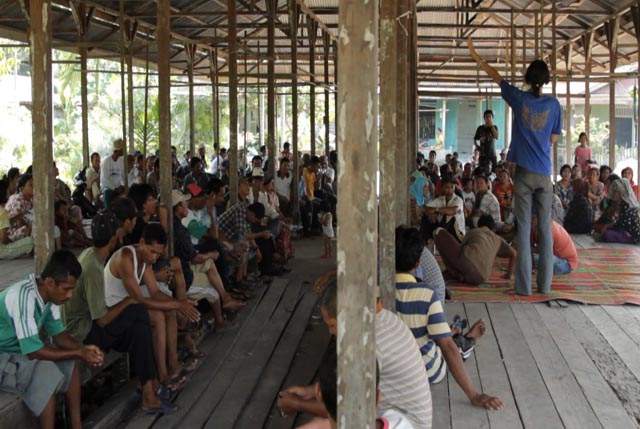Organise a screening

Screenings in directly affected communities
The primary audience of our films is indigenous and forest dependent communities. If you work directly with communities facing the issues explored in our films, or would like to recommend a group to contact, please get in touch. You can download the films on this website, or contact us to request free DVD or VCD copies.
In communities the films can simply be screened but for maximum impact they are best supported by a community facilitator as part of a wider meeting, screening, workshop or training.
The role of the community facilitator
The community facilitator might be someone from the community, someone from a local NGO or community organization or an educator or teacher.
They can be responsible for:
• Organizing the screening
• Introducing the films
• Facilitating a discussion after the films
• Following up on agreed actions.
How to organize a community screening
- • Get permission from the community and appropriate individuals.
- • Set a date, time and location for the screening.
- • Think about who to invite (community members, women, youth, other local communities); spread invitations using posters, word of mouth, internet, mobile phone.
- • Equipment. You will need a DVD/VCD player, TV/LCD, and speakers. You could also use projector laptop and speakers. Make sure you test the equipment before the screening, especially check that the sound is loud enough for everyone to hear. Remember to buy diesel if you are using a generator.
- • Prepare snacks or invite people to bring food along to share with others
Community facilitator's tips
- • Watch the film yourself before screening it to the community.
- • Leave enough time after the screening for discussions. See the 'Examples of Discussions Questions' sheets for possible options. Prepare questions in advance.
- • Encourage a good mix of people to contribute in the discussions.
- • Encourage people to think about the differences and similarities between the examples shown in the films and your situation locally.
- • Support communities to develop and carry out an action plan based on their own situation and priorities.
- • Take notes of feedback and comments. Take time to reflect on the screening for you and your audience. In what ways can it be improved for the next screening.
Screenings to policy makers and wider audiences
LifeMosaic's films have been screened in many countries and in many different settings. If you have a suggestion for a relevant event to screen one of our films at, or if you would like to discuss organising such a screening, please get in touch.
In the past screenings have been held at: conferences, film festivals, in schools and universities, and in NGO, company, policy makers and government meetings.
Get Involved
“The topics in the Territories of Life films are topics that touch us deeply - Through translating these testimonies into our own Baka language I am appreciating this very much. There are many many Baka villages that will gain from this not only me who has the privilege to be in this work”
Baka translator, Cameroon
